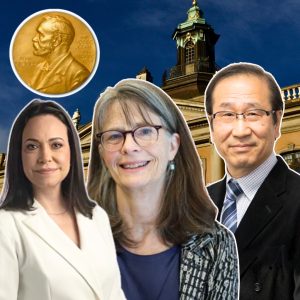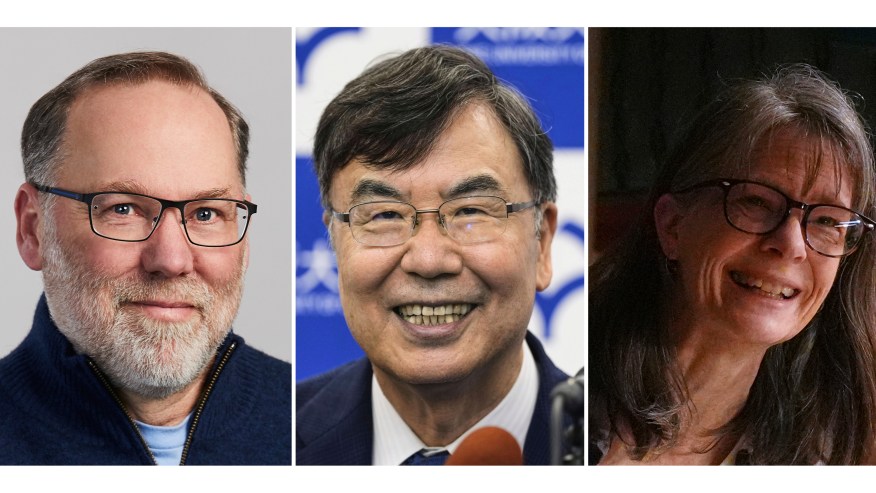The 2025 Nobel Prizes were awarded to a diverse group of thinkers, scientists, writers and activists whose work ranges from the deepest questions in quantum physics to grassroots struggles for democracy. The New Daily Prime has summarised each laureate (or group of laureates), explained the discovery or achievement the Nobel committees awarded, and described why it matters.

Physiology or Medicine – Mary E. Brunkow, Frederick J. Ramsdell, Shimon Sakaguchi
What they discovered: The committees recognised work that clarified how the immune system avoids attacking the body’s own tissues, specifically mechanisms of peripheral immune tolerance and key regulatory T cell pathways. Their discoveries show how certain immune cells act as internal “brakes,” preventing autoimmune reactions.
Why it matters: Understanding immune tolerance is central to treating autoimmune disease, improving organ transplants, and designing immunotherapies that avoid dangerously overactive immune responses. The practical payoff includes new drug targets and better strategies to tune immune reactions in cancer, autoimmunity and transplantation.
Physics – John Clarke, Michel H. Devoret, John M. Martinis
What they discovered: The trio was honored for demonstrating macroscopic quantum phenomena showing quantum tunnelling and discrete energy levels in engineered electrical circuits large enough to hold in your hand. In other words, they made circuits where quantum behaviors (traditionally seen in atoms) appear at a human- scale device level.
Why it matters: This line of work underpins superconducting quantum circuits, which are a leading platform for quantum computing and quantum sensing. Their experiments helped bridge fundamental quantum physics and the emerging technologies that aim to harness quantum effects for computation, precision measurement, and secure communications.
Chemistry – Susumu Kitagawa, Richard Robson, Omar M. Yaghi
What they developed: The Nobel Committee recognised the development and conceptualisation of metal–organic frameworks (MOFs), porous, crystalline materials made from metal ions linked by organic molecules. MOFs are a modular family of structures whose internal surfaces can be tuned with atomic precision.
Why it matters: MOFs provide record-high surface areas and customizable chemistry that make them ideal for gas storage and separation (e.g., capturing CO₂ or storing hydrogen), catalysis, sensors, and drug delivery. They are essentially a new molecular architecture with broad applications in green chemistry and materials science.
Literature – László Krasznahorkai
What the prize recognised: The Swedish Academy awarded the Literature Prize to Krasznahorkai for a body of work described as “compelling and visionary,” marked by long, intense prose, existential themes, and an often bleak, visionary outlook that nevertheless foregrounds art’s endurance. His novels (such as Satantango and Baron Wenckheim’s Homecoming) fuse absurdism, epic scale, and lyrical density.
Why it matters: The prize highlights a literary voice that stretches narrative form and language, influencing contemporary fiction and translation communities. For readers and writers, Krasznahorkai’s work is an example of how stylistic risk-taking and philosophical depth can reshape modern narrative expectations.
Peace – María Corina Machado
Why she was awarded: The Norwegian Nobel Committee honored Machado for “tireless work promoting democratic rights for the people of Venezuela” and for her role as a leading figure in Venezuela’s opposition movement, pressing for a transition away from authoritarian rule. Her activism carried out despite political bans, detention risk and exile among associates. She was awarded as an emblem of democratic resistance.
Context and reactions: Machado’s award has drawn immediate international attention and debate. Supporters see the prize as recognition of bravery and the struggle for electoral freedom; critics argue the committee’s choice is politically charged. Coverage in major outlets describes Machado’s background (engineering education, civic activism) and the fraught state of Venezuelan politics that makes her activism risky.
Economic Sciences -Joel Mokyr, Philippe Aghion, Peter Howitt
What they explained: The Royal Swedish Academy of Sciences awarded the economics prize to this trio for insights into how innovation, not just capital accumulation drives sustained economic growth. Their theoretical and empirical work clarifies conditions that foster technological progress, the dynamics of “creative destruction,” and policy levers that can encourage productive innovation.
Why it matters: Their frameworks are influential for contemporary debates on industrial policy, inequality, education and how to design institutions that channel technological progress into broad-based prosperity rather than concentrated gains. Policymakers, central banks and international organizations often draw on these ideas when weighing innovation incentives and competition policy.
What the 2025 roundup tells us (big-picture takeaways)
- Science prizes reward both fundamental understanding and technology enablers. Physics and chemistry laureates were recognized for discoveries that are deeply theoretical and directly relevant to technologies (quantum circuits, MOFs).
- Biomedicine continues to focus on regulation and safety. The Medicine prize highlights the global importance of controlling immune responses central to treating autoimmune disease and improving immune-based therapies.
- Prize committees continue to place civic courage and literary craft on the global stage. The Peace and Literature awards underline how literature and political activism remain vital arenas for shaping public life and conscience.
- Economics is centering innovation as the engine of long-run growth. This both reflects and informs policy debates about technology, labor markets and inequality.



